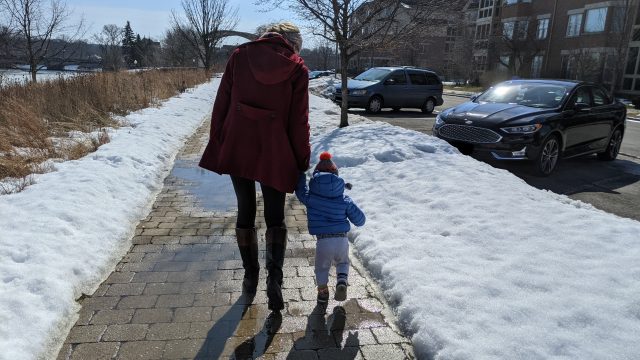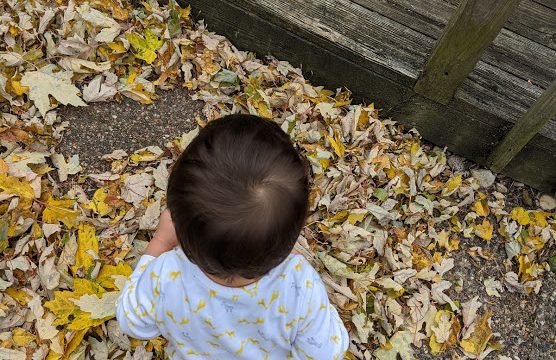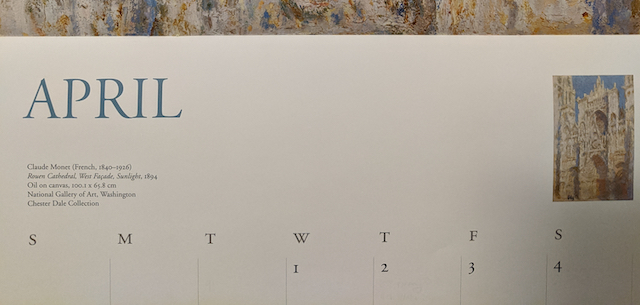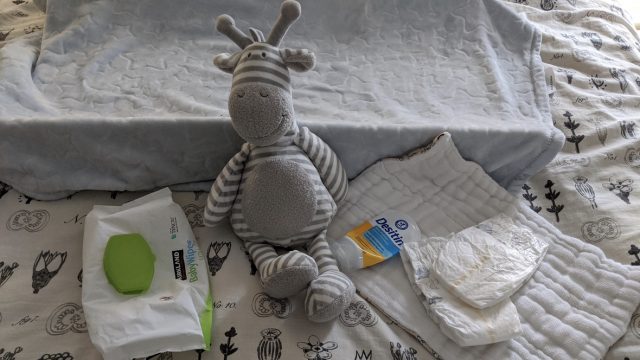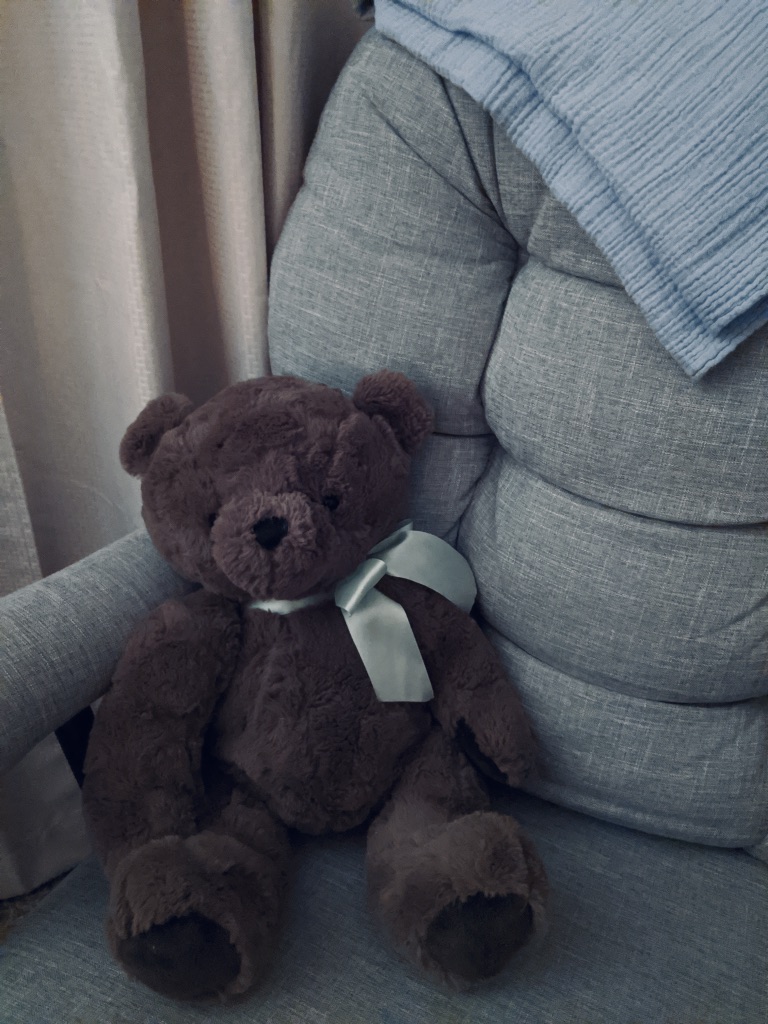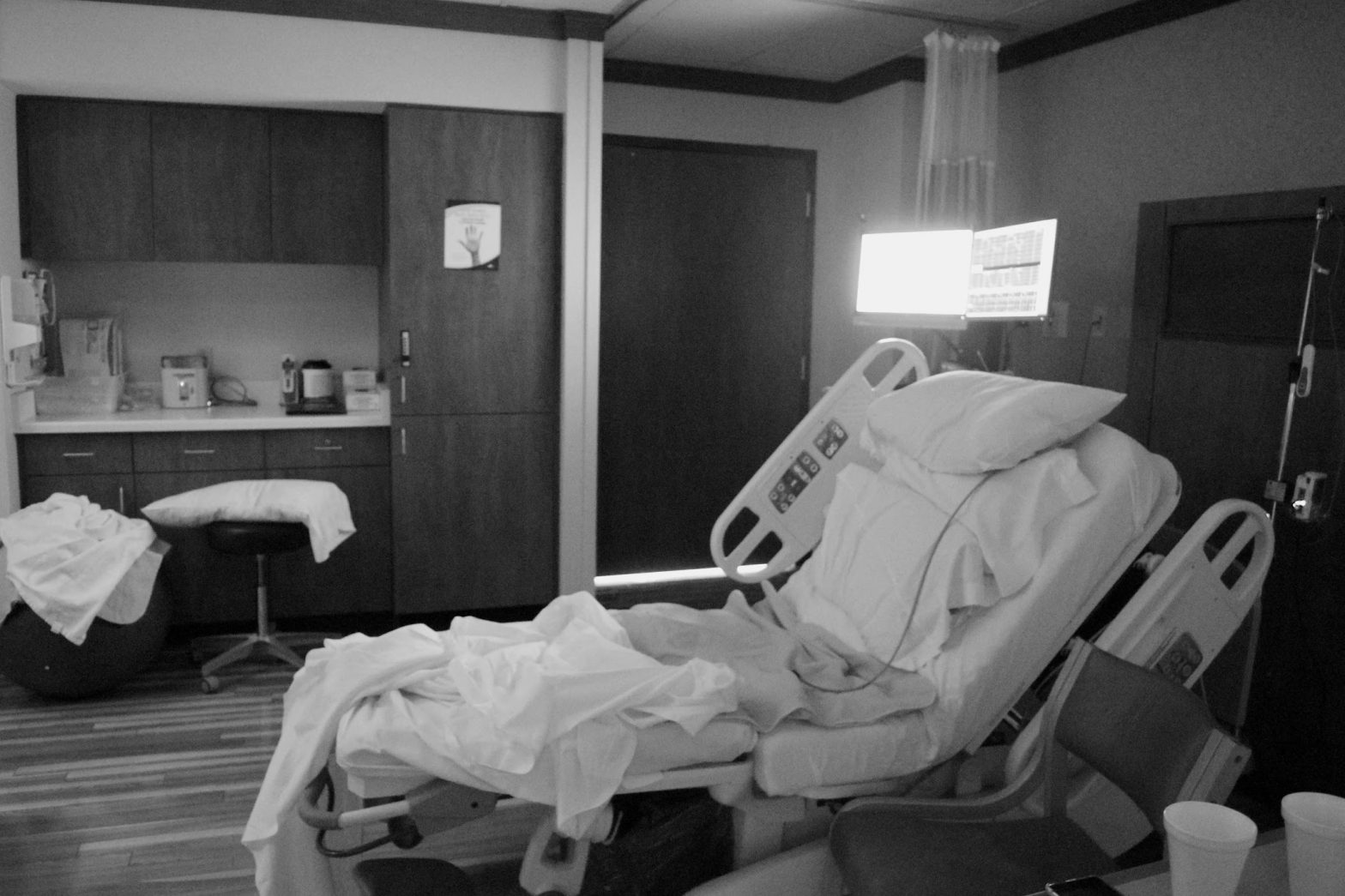welcome to the world, bright and shining little one - in your coming, you've opened a profound window to my soul. holding you in my arms, i cross the threshold into the mysterious unknown, forever changed.
Category: Motherhood
welcome
welcome to the world, bright and shining little one, threshold to my soul.
Walls
I just feel so much. I say, with a tear-squeaky voice. I know. You say, holding space. You’re not alone. My carefully constructed walls continue to crumble. Have courage, my vulnerable, beating heart. I’m flooded with the joy, and terror, of love.
A Moment of Joy Together
This weekend—on the first lovely, warmish, and sunny weekend day that we’ve had in what feels like ages—we went on a little walk as a family of four around our neighborhood, to the river, and through the local downtown. We were all delighted and a bit amazed to be out after weeks of subfreezing temperatures, and to simply enjoy the sun and fresh air on our skin as we wandered about on clear sidewalks and noticed signs of new spring life.
This was my toddler’s first opportunity to actually walk on the sidewalk (!!!), as he learned to walk this past fall just as the weather started to turn. Soon snow and boots and puffy jackets made it too challenging for him to be able to get about outside apart from standing uncertainly in the snow—looking like a stuck marshmallow in his snowsuit!—and being carried and riding on the sled as we pull him around the backyard. Some of these outdoor activities seemed to be at least a bit fun for him, but also left him without the opportunity to enjoy moving about on his own two little feet.
So, getting to take his own steps by the river, following his big brother, seemed to amaze my toddler’s little heart. As he held tightly to my hand, he let out peals of delighted laughter and flashed bright smiles, trying to keep up with his older brother who was bravely and excitedly running ahead to lead the way.
Later, after a bit of time in the stroller and being carried, I set my toddler back down on the sidewalk again nearer to our home. I held one hand, and his big brother held his other hand, while Daddy pushed the stroller along behind us. Whenever his big brother let go of his hand to go check something out, my toddler reached out his hand towards his big brother, calling “moh, moh!” (for “more”).
And so we all walked along for a few minutes, enjoying being in one another’s presence, alive together in the same moment experiencing the same simple joys in the same lovely sunshine. It was one of those precious, rare, fleeting moments, where I was flooded with such a sense of pure joy and contentment.
It was a simple moment, and yet a profound one too, and my heart swelled with love for those I hold dear. This small moment is probably one of my favorite times I’ve gotten to share with my little family. And it was lovely.
(Of course this moment did not last forever. Just a few minutes later one of the boys was throwing a tantrum. And then we were faced with the awful, wonderful chaos of getting everyone herded back up the steps to our home and inside, taking shoes and gloves and coats and scarves and hats off. Hands needed to be washed, snacks and diapers and potty breaks and attempted naps needed to be faced. And on and on—all the little normal and hectic and ceaseless moments of everyday life.)
And yet that sweet moment as our little family of four on our walk was very precious, and was such a gift, reminding me of the deep joy that sometimes comes unexpectedly and unforced, in little moments of togetherness in life. And I felt so grateful.
I know I can’t hold tightly to my sons’ hands forever, just as I can’t hold on to time and freeze moments eternally. And I suppose I wouldn’t truly want to, as a part of the beauty and heartbreak of life is growth, change, movement. But I can soak up these moments of love and joy and presence as they come, and I can hold them in my heart.
Yet Another Goodbye
I think I nursed my baby for the final time last night, as tonight I ended up skipping our nightly nursing and instead just sang to him and gave him a cup of milk. While I didn’t plan it in advance, I’ve known this day was likely coming sooner rather than later, as my baby is 16 months now and in recent days has been barely nursing before I tuck him into bed.
For the last month or two, I’ve stopped bringing my phone with me when I rock and nurse him, so that instead of being distracted by scrolling (ever more disheartening) news stories, I can just be mindful of him. I’m thankful for this, for these extra moments of singing to him and noticing the warm weight of him in my arms, the shape of his cheeks, the sound of his breathing and swallowing, the smell of his freshly shampoo-ed hair, what it feels like squeeze his warm, pajammied squishiness close.
But these last couple of days he has hardly nursed at all when I rock him, although he still has wanted to snuggle and sing bedtime lullabies with me. And tonight it just felt right to forego nursing altogether, even though a part of me didn’t want to believe the time to say goodbye had truly come. I suppose this is yet another lesson in the complexity of holding multiple experiences, of how even something that is good and right can also feel sad and hard.
I’ve been putting off ending nursing with him in a way that I didn’t with my first. I’m not sure exactly why. I think a part of it may be because this time I don’t know if I will ever nurse again. Will I have another baby, or will my second also be my last? Right now I don’t have an answer; I really don’t know. And yet from this space of not knowing I still need to live, to love.
I think another part of my reticence also has to do with not wanting to say goodbye to yet another precious thing, after a year of what has felt like loss after loss and sorrow upon sorrow—globally, nationally, and personally (even though I realize I’ve lost far less than many). All of these layers of grief make one more loss—even a loss that is a healthy and even joyful part of my baby growing into toddlerhood—feel sad.
Losing nursing reminds me of other losses, of things that are gone and can never be again. And it goes against my desire to freeze time and hold everything close and familiar, as it is, forever. I realize, intellectually, that a part of life is that it is always changing, growing, shifting—with loss and joy intermingled. But my heart still feels sad for now.
I suppose sadness and loss are fitting reflections and feelings to be experiencing during this first week of lent, a time when we are called to remember and honor and enter into suffering (Jesus’, others’, our own). I want to be brave enough to make space for grief, even while holding on to the hope of life—life offered in the full by Jesus, but also in the little everyday experiences such as how my boys grow and play and laugh and cry, fiercely feeling and present even amidst the sorrows of the world.
A Note of Love to my One Year Old
And just like that, my littlest love, you are 1, and you are walking..!
In what has been a dark year in the world and in my own emotional life, you have been such a beam of light. I’m so grateful for you, and I delight in you and in getting to know and love you more each day.
I’m so thankful for your joyful and resilient spirit, how quick you are to smile and laugh, how you’re not afraid to show your feelings of sadness and anger, how you get back up when you fall, how you face your fears with a growl and a show of curiosity, how you seek out relationship and also know how to be independent, how you know how to make the best of things, how you insist on your voice being heard, how you delight in learning new things, how incredibly busy you are, how you love to give kisses.
There are many things you (and your big brother) have been teaching me this year, but one lesson in particular that I’ve been reflecting on is about love. You have been showing me how love—and the context in which love occurs—does not have to be “perfect” in order to be “good enough”, and that there is joy and grace and unexpected resilience in this (less-than-perfect) space that is messy but still beautiful.
When you entered the world in 2019, none of us had any idea what 2020 would have in store, and the first year of your life definitely did not look like what I had imagined. But amidst many tears and worries, this year has also had so much love and hope, and we have shared many dear moments amidst the difficulty. I wouldn’t trade you, or the time we have shared together as a family this past year, for the world.
And now you are walking bravely ahead into a new year of life, falling down and getting back up, toddling here and there and everywhere. When you took your first steps a few weeks ago, you looked so very happy and full of smiles. We all bore witness to your accomplishment, and were so proud of you. Your big brother exclaimed, “Our baby is growing!”—and indeed you are. I cried—tears of joy (for your obvious delight, for how you are growing just as you are meant to), tears of sadness (don’t grow too quickly though, my little one).
Already you seem less like a baby and more like a toddler. Sometimes when I am rocking you at night, and you are still and calm, I just gaze at your precious, round baby face and your little open mouth. I feel your warm, milky breath puffing softly on my cheek; I soak up the warm weight of you in my arms. And I love you, and will always love you.
I hope you always know how wanted, loved, cherished, and delighted in you are—by me and your Dada, by your big brother, by your extended family, by Jesus.
I love you, my littlest love, my one year old. May you be brave, be kind, and grow, my little one. And as you grow bigger, may God grow your faith and keep you ever in his love.
But you, dear friends, by building yourselves up in your most holy faith and praying in the Holy Spirit, keep yourselves in God’s love as you wait for the mercy of our Lord Jesus Christ to bring you to eternal life…To him who is able to keep you from stumbling and to present you before his glorious presence without fault and with great joy— to the only God our Savior be glory, majesty, power and authority, through Jesus Christ our Lord, before all ages, now and forevermore! Amen.
Jude 20-21, 24-25
Gratitude and Grief, Uncertainty and Certainty
It still feels surreal, 15 days into our state’s Shelter-in-Place order, to say that we are living in a pandemic. To be honest, I often find myself feeling overwhelmed by both gratitude and grief in this time of painfully great uncertainty.
I am overwhelmed with gratitude and love for my dear husband and precious little boys, for my extended family, for my friends. I am deeply grateful for the true and certain hope we have in Jesus no matter our earthly circumstance. I am thankful for our church and the fact that we are still able to meet virtually. I am grateful we still have a home and food on the table. I’m thankful we have technology to still connect with loved ones even from afar. I’m grateful that God’s mercies are new each morning. I’m thankful for the courageous men and women who are risking their lives during this time to help others, ranging from medical professionals, to grocery store workers, to people who deliver food and supplies and mail, to people who clean, to emergency responders, to every other person whose job means they are currently unable to stay home. My list of things to be grateful for is long, and I have been trying to note big and little things I am thankful for each day (and have been finding the gratitude app Presently helpful towards this end).
But I also feel overwhelmed with grief and fear. I of course most fear the loss of those I love. And I am deeply saddened by loss of life and livelihood that are already occurring in the lives of people I know as well as on a global scale. I mourn for the heartache our world is experiencing, and for the emotional and relational and spiritual and physical strain of this experience that impacts and will continue to impact each of us in different ways. And I am grieving the smaller losses of everyday life as we know it even as we are only just beginning lockdown and physical distancing—even little things like not being able to visit family and friends, or not being able to take the boys to the park or go on a family outing, or not being able to go to church in person. I feel dizzy even trying to categorize these countless layers of loss and uncertainty. I know that this earthly future has always been uncertain, but suddenly the fragile and fleeting beauty of everyday life seems glaringly evident.
What will this earthly future hold? I truly don’t know. And that is scary to say, especially as a momma to such young children. I’ve been finding it hard to focus on in-depth study of the Bible or on lengthy prayers, as my fear and shock often leave me feeling scattered and somewhat disoriented. But I have been trying to pray even small prayers throughout the day, to read even a few verses, to talk and pray with my husband, to listen to the daily messages our pastor has been putting out, to listen to and sing worship songs, and to trust the Holy Spirit to intercede when I feel so weak. I’ve been thankful that as believers—my husband and I, our church community, our friends and family—we have had the opportunity to continue to preach the gospel to one another and to ourselves throughout these days, even if we do so imperfectly. And I know we will continue to need to do so through calls and video meetings and emails and texts through the many uncertain days ahead.
Amidst all this uncertainty I have been trying to hold fast to two certain verses that provide hope for both the present and the future:
“When I am afraid, I put my trust in you.” – Psalm 56:3
“So that by two unchangeable things, in which it is impossible for God to lie, we who have fled for refuge might have strong encouragement to hold fast to the hope set before us. We have this as a sure and steadfast anchor of the soul, a hope that enters into the inner place behind the curtain, where Jesus has gone as a forerunner on our behalf, having become a high priest forever after the order of Melchizedek.” – Hebrews 6:18-20
May we gratefully trust in and hold fast to Jesus, our only certain anchor during the deep sadness and uncertainty of this new age of the COVID19 pandemic.
A Question of Identity
I am now a stay-at-home mom. After much deliberation, my husband and I decided to have me resign from my work as a marriage and family therapist to stay home full-time with my own family. This is a bittersweet step for me. I feel so joyful thinking of what I am moving toward: getting to devote myself fully to being home as a wife and a momma for this season. But I feel genuine loss and sadness over giving up—at least for the time being—work that I find to be deeply meaningful at a practice I genuinely like.
Now I find myself wrestling with the question “Who am I?” in a way that I didn’t when I first became a mom—and I’m rather jarred by the many identity-related questions that I have been feeling seemingly suddenly and simultaneously:
What if I lose sight of who I am, and who others are?
What if I become boring to my husband and don’t have anything to talk to him about apart from our kids?
What if I make my kids into my whole life?
What if I lose my spark and passion now that I am staying at home, and simply become tired?
What if my world becomes small and I lose sight of all perspective?
What if I become lonely?
What if I become consumed by worry?
What if I never even get to talk to any other adults without being interrupted by little ones?
What if I don’t have any complex or intelligent or even coherent thoughts anymore?
What if I rarely have car-rides by myself to listen to podcasts, or consume any noteworthy news, or learn any new skills, or even just to do anything interesting or thought-provoking?
What I begin to measure my worth by how “successful” I am in accomplishing tasks at home and in caring for my boys, and become even more task-oriented, controlling, and perfectionist than ever?
My list of questions big and small could go on and on.
Yet I suppose as I reflect upon these and other questions of identity I realize there is danger in defining my entire being as any one particular part of myself or actions. I have always been prone to pursuing meaning through fulfilling my roles, keeping busy, and striving after accomplishment. Even my career had the danger of being an idol and wasn’t truly a solid way for me to define myself, although I did find it deeply honoring and meaningful to get to walk with others on their respective journeys as part of my work as a therapist. But then again, I also find it deeply honoring and meaningful to be a wife, and a mother, and a daughter, and a sister, and a friend.
These roles—along with many other roles, characteristics, and passions—are a part of who I am, but none should ultimately define me. If my primary identity was in being a therapist—rather than having this be just a part, albeit significant, of who I am—then I have a problem, just like I have a problem if I hinge my whole sense of self and meaning on being a mom, or being a wife, or being orderly or “right”, and so on. Ultimately, I need to find my identity most deeply in Jesus and my relationship with him. These other facets of who I am and what I do and what I care about are significant, but while they make beautiful outgrowths they are a poor foundation upon which to build my life.
Ultimately, only Jesus is a truly sure foundation.
I believe this to be true. Yet I also know that I need time to process my many questions and feelings, and to both grieve and celebrate this transition. So I will choose to trust in Jesus while leaning into the vulnerability and messiness of opening my heart to having so many feelings and questions about this change. I will try to cry when I am sad over my loss while also noticing and rejoicing in the sweet moments I am gaining with those I love. I will be thankful for the time I got to work as a therapist, and I will also be thankful for the time I now have to be with my family. I will try to take time to talk about and reflect upon and feel my experiences.
I hope I can slowly learn anew who I am in Jesus and what it looks like in this new season of my life to have him truly be the foundation upon which I build my identity and from which I draw strength to love and live faithfully—including in, but not limited to, my role as a momma to my precious little boys.
Help From Our Faithful Father
My days at home are filled with requests for me to meet the near-constant needs of my little ones—physical needs, emotional needs, relational needs: “Mommy, I hungry!”; “Mama, I pooped!”; “I need help, Mommy!”; “I want (fill in the blank)!”; “Mama, I sad! I cwying!”; “Wook at dis!”; “Mommy, pway with me!”; “(Crying)”. My children so naturally turn to me whenever they feel a need, and look to me to be able to help them. Because I love them, I try my best to meet their needs when they call, and respond to them again and again: wiping tearful cheeks as well as poopy bottoms, feeding and nursing, playing and reading, teaching and talking, snuggling and listening, and on and on. Each of these seemingly ordinary earthly experiences can point me to the gospel, reminding me both of the hope we have in God the Father’s faithful love for his children, and of my own neediness as his own child.
My role as a mother, loving my own boys, gives me a tiny glimpse of how God, as our heavenly Father, faithfully loves me along with all his other children. It amazes me that God loves us (1 Jn. 3:1), is always faithful (1 Cor. 1:9), sees and hears us (Gen. 16:11, 13), answers us when we call (Matt. 7:7-11; Ps. 91:15), comforts us (2 Cor. 1:4), knows our needs and cares for us (Matt. 6:8, 25-34). He delights in us bringing our needs honestly before him in prayer (Prov. 15:8; Matt. 6:5-14), disciplines us out of love (Heb. 12:3-11), and gives us what is for his glory and our good (Rom. 8:28). Our Father is “compassionate and gracious, slow to anger, abounding in love” (Ps. 103:8), and nothing can separate us from the love he bestows upon us in Jesus (Rom. 8:38-39). Given how fiercely even I, in all my imperfections, love my boys, it is astounding to think of how much more our perfect heavenly Father loves me and all of his children.
Witnessing and responding to the constant neediness of my boys also reminds me of my own experience as God’s child. Just as my little ones are often so helpless to help themselves, and even literally cannot survive without my care, I cannot save myself or even sustain myself apart from God’s care. His common grace, shown throughout all creation even as he holds all things together in Jesus (Col. 1:15-20), sustains my physical life and breath (Job 12:10); his special salvific grace expressed in Jesus and given in an ongoing manner through the Holy Spirit sustains my spiritual life (Jn. 10:10; Gal. 5:25). Never has my own need for God’s love and strength been as evident to me as now in this season of early motherhood, when I daily feel my own weakness and neediness as I come again and again to the end of my own physical and emotional and spiritual strength, wondering how on earth I can possible respond to one more cry for help, change one more diaper, wipe one more tear, wake up one more time in the dark hours of the night to nurse, give myself to one more moment of intentional presence with my boys. And yet my children’s neediness and how they cry out to me for help, paired with my own neediness when consistently faced with my own inability, provide repeated opportunities for me to cry to my own heavenly Father for help and strength.
How thankful I am that we have a faithful heavenly Father, whose strength never fails, whose “power is made perfect in weakness” (2 Cor. 12:9), and who “has given us everything we need for life and godliness” (2 Peter 1:3). I hope and pray that remembering how much I am loved and filled by God in Jesus through the ongoing work of the Holy Spirit will encourage me to love my own children from a place of fullness—a fullness that does not originate from me or my own abilities or efforts. I also pray that the Holy Spirit will be growing me in the habit of using the seemingly infinite number of the small daily moments of neediness in motherhood as prompts for humility, reminders to vulnerably confess and pray to my Father for help, and opportunities to worship God and trust in him and his sustaining grace. We can trust that God the Father’s faithfulness toward us gives us “strength for today and bright hope for tomorrow” (as celebrated in the hymn “Great is Thy Faithfulness”), equipping us to faithfully love our own children and those around us with the love that he first showed us (1 Jn. 4:11).
May remembering God the Father’s faithfulness move us to worship, even as we look to him for help:
“Great is Thy Faithfulness”
“Great is Thy faithfulness,” O God my Father,
There is no shadow of turning with Thee;
Thou changest not, Thy compassions, they fail not
As Thou hast been Thou forever wilt be.
“Great is Thy faithfulness!” “Great is Thy faithfulness!”
Morning by morning new mercies I see;
All I have needed Thy hand hath provided—
“Great is Thy faithfulness,” Lord, unto me!
Summer and winter, and springtime and harvest,
Sun, moon and stars in their courses above,
Join with all nature in manifold witness
To Thy great faithfulness, mercy and love.
Pardon for sin and a peace that endureth,
Thine own dear presence to cheer and to guide;
Strength for today and bright hope for tomorrow,
Blessings all mine, with ten thousand beside!
-“Great is Thy Faithfulness”
Laboring, Together
Last month, my husband and I welcomed our second precious little baby boy into the world! And while this experience is impossible to fully capture in words, something I can say is that it has led me to marvel once again at the beauty and power of relationship, and of being present in relationship—with others, as well as ultimately with God. It also has led me to rejoice anew in the hope of the Gospel.
I had a grueling and somewhat traumatizing first labor, although thankfully both my first baby as well as I ended up being okay in the end. Yet after this experience, “horrifying” was the main word that came to mind, unbidden, whenever I thought of labor. And even though I dearly wanted to have another baby, as soon as I discovered I was pregnant for the second time, I began having nightmares about having to give birth. During my first labor, my experience of intense pain led me to panic, struggle for control, fight against the pain, and turn inward—which left me feeling alone and overwhelmed even though my husband, my doula, and my nurses were all in the room to support me. Although I was present physically, emotionally I was completely alone and checked out. As I learned from processing with my husband and doula later on, they said they too felt I was unreachable, and that they felt helpless to help me in my pain as I was turned so far inward in spite of them wanting to be with me.
As my husband and I, along with our doula, processed our first birth experience and looked toward our second, we thought a lot about what we appreciated about our first experience as well as what we hoped would be different the second time around. And the main two words we came to were “present” and “trusting”. We hoped and prayed that we could have an experience in which we were more present with one another and in our experience—rather than fearful—and more trusting of one another, our support team, in the process itself, and ultimately the LORD.
Practically, there were certain exercises I practiced to help me work through some of the trauma and reactivity I felt regarding labor, including praying, talking with my husband and trusted friends to process various aspects of my experience, using the Gentle Birth program to practice mindfulness and breathing exercises and some hypnotherapy exercises, and journaling. But mostly preparing for a labor where I and my husband hoped we could be more present looked like me, as well as him, trying to be more intentional in our everyday lives in being vulnerable, present, and trusting in our relationships and our ensuing emotions. We tried to be intentional in these ways our relationships with each other, with family and friends, in our relationship with God, even in our relationship with ourselves. And as we prepared and invited more people into our experience, while we were still afraid at times, we also found that we were slowly but surely moving towards feeling more connected and hopeful—more present and trusting.
And when the long-anticipated day of labor finally came, my husband and I felt the LORD’s presence with us in such a special way even as we were present with one another, our doula, and the support staff at the hospital. While of course there were many moments of pain and difficulty, the pain and the difficulty felt “okay” instead of “horrifying” because I did not feel alone. When the pain came, instead of turning inward, I tried to invite others into my experience as well as to respond to their offers of reaching to me, helping me, and sitting with me in that space. My husband stayed with me, offering his steady and encouraging and comforting presence through the highs and lows, and we felt all the more connected in our love for one another for going through this special experience together. My doula stayed with me, offering her reassuring, comforting, and competent presence as she helped me continue on even when it felt so hard. The nurses and doctors stayed with me, offering encouragement and well as the ability to practically care for the well-being of me and my baby.
Staying present with my husband and with the rest of my support team, as well as staying present in my own emotional experience, felt incredibly vulnerable—it is hard to imagine a more physically and emotionally messy and vulnerable time of life than labor. I was tempted many times to slip back into my typical response of trying to take control and turn inward, and even moved toward this space at times. But I am so grateful my husband and support team stayed with me, beckoning me back even in these hard moments, and that overall by God’s grace I was able to respond to their invitations to presence. And the connection that came out of being present and trusting was so beautiful and richly rewarding, and made the experience of labor and delivery all the more profound and joyful. As my husband and doula and support team sat with me in my distress and proved able to hold my experience, they also rejoiced with me when the long-awaited moment of baby’s entry into the world came. What a sweet moment birth finally was, a moment that was all the sweeter for being shared amidst all of us that were in the room!
I am convinced that as is the case with so much of earthly life, my experience of relationship in labor is a small reflection of many aspects of the Gospel. During labor, my husband and my doula offered me unconditional love and presence, as well as the ability and willingness to hold my emotions and experience. Even when—in both an emotional as well as a literal physical sense—I was weak, and needy, and messy, and completely vulnerable, they never failed to stay with me. Instead of leaving me alone, or telling me to clean up or get it together, or to rely on my own strength, they entered into my experience and sat with me until labor was complete, I delivered my dear baby, and gradually I began to recover. I am unspeakably grateful, humbled, and filled with love as I think of the grace, love, and help my husband and doula extended to me even in this most tender of moments.
The power of relationship that I experience in labor provides me with a beautiful, tangible glimpse of the unconditional love and grace that God extends to us in Jesus by the power of his Holy Spirit: He invites us into relationship with him, through the cleansing work of Jesus on the cross and by the ongoing presence of the Holy Spirit. Though we were spiritually entangled and dirtied in our sin, helpless to save ourselves apart from him—as messy and as unloveable and needy as we could possibly be—he entered into relationship with us, cleansed us, welcomed us into new life, adopted us as his very sons and daughters (e.g., Eph. 1-2). And he continues to offer his presence to us in the person of the Holy Spirit (e.g., Jn. 14:16-17, 26-27); he is a God who is near (e.g., Phil. 4:5), who comforts us (e.g., 2 Cor. 1:3-4), who saves us (e.g., Jn. 3:16-17). Because he is with us, we can remain true and faithful until he returns (e.g., 1 Cor. 1:4, 7-9). And someday, once Jesus does return and make all things right, we will be perfectly in relationship with him, all sorrow will have passed, and we will rejoice with Jesus and with one another (e.g., Rev. 21:5, 22:1-5). We are not alone, and never will be. If, as I experienced in labor, relationship with fellow humans is so powerful and life-changing, even to the point of making the seemingly unbearable bearable, how much more profound is relationship with the one true God?
How thankful I am for presence and trust in relationships—relationship with loved ones, and ultimately relationship with the LORD.
*My husband and I are infinitely grateful for our doula, whose presence with us in labor made all the difference in the world!
